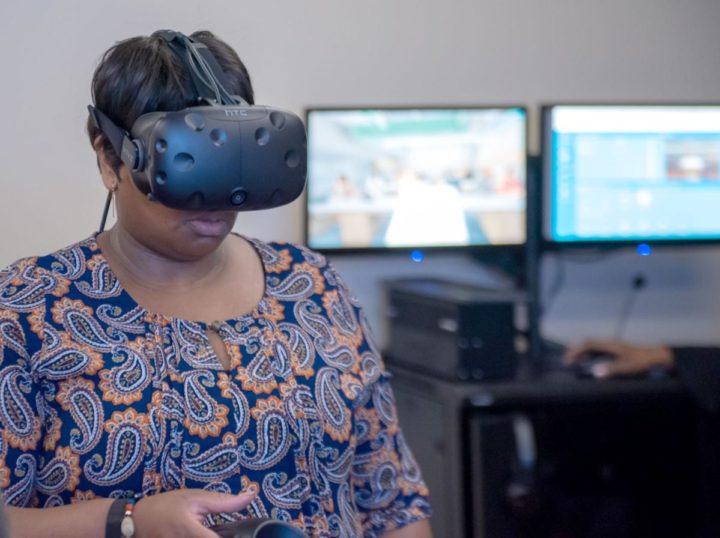Virtual reality a valuable behavioral health aid

“It feels like I’m there,” a man tells his therapist, looking to his left and right and walking down that familiar street in Iraq.
But this time he’s not actually there. Instead, he is standing in the safety of a Florence office wearing a headset and headphones with his therapist by his side. Through each session of virtual reality (VR) exposure therapy, he is better able to confront the emotions and the memories that have kept him feeling stuck.
For those suffering from post traumatic stress disorder (PTSD), prolonged exposure is considered to be a gold standard treatment for behavioral health. Many who have experienced trauma find short-term relief in avoiding the memories, thoughts and feelings associated with the event.
This, however, can prevent long-term healing, and exposure therapy works to empower the individual to confront and emotionally process that which has been avoided.
By being gradually exposed to trauma-related reminders in a safe environment and using coping skills with the guidance of a therapist:
- Fear and distress decrease.
- Experiences can be processed, allowing for new learning to take place.
- Patients are able to gain perspective.
- Patients feel better about their ability to manage future symptoms.
VR exposure therapy is an evidence-based clinical tool that enables therapists to recreate different environments and situations that their patients have experienced in a safe but immersive sensory experience. Such simulated environments can “feel real,” evoking physical and emotional reactions that would not otherwise occur in a therapy session, allowing the patient to work through and learn how to cope more effectively.
Additionally, therapy is bolstered by the tailor-made stimulus-rich environment, meaning that individuals not only talk about past experiences in a therapy session but also do so while seeing, hearing and feeling things that are linked to their memories.
The Virtually Better software at HopeHealth has VR modules for those with PTSD who served in Iraq and Afghanistan, simulating actual scenes and environments. For example, a veteran would be able to walk around a market or a military base in Afghanistan while hearing people around him and feeling the rumble of a plane flying overhead.
With numerous settings, a therapist can gradually add relevant details to the virtual experience as patients better manage anxiety and gain control over traumatic memories. Thus, by engaging their senses more deeply, a richer emotional processing can take place.
This software has wider-reaching applications as well. Individuals suffering from specific phobias can confront fears while working through their emotional and physical reactions, and do so in a safe, controlled and gradual way.
By engaging in simulations that include fears such as thunderstorms, spiders and dogs, a person can take a different approach to deal with anxieties and practice coping skills. This virtual capability can bridge the gap between the therapy room and the real world, allowing for individuals and their therapists to work through experiences “outside” or those that would otherwise be difficult or impractical to bring into the office.
For example, someone with a fear of flying can use VR exposure therapy to become more comfortable simply sitting on a plane and eventually being a passenger on a flight from takeoff to landing.
Lastly, HopeHealth’s VR equipment can also assist with relaxation and meditation. Several environments in the program can teach patients deep-breathing exercises as they learn to control their body’s physical reactions to stress and anxiety. Guided meditations also help patients learn to clear their mind and refocus their thoughts.
As a clinical psychologist, I am encouraged by the way that technology is being adapted to enhance treatment and more fully engage those who experience mental health issues. Promising research continues to support the use of VR-assisted therapy, and I anticipate that the field will continue to see new ways to apply VR.
For those who are suffering from PTSD or phobias and feel stuck, this new tool brings hope for a better quality of life.
Dr. Will Hunter joined HopeHealth on Palmetto Street in Florence in September 2018 as a clinical psychologist in Behavioral Health Services. He has received training in cognitive processing therapy for post traumatic stress disorder (PTSD) and enjoys working with veterans. His clinical interests include the diagnostic assessment of complex mental health issues, crisis intervention and risk assessment, and the treatment of severe and chronic mental illness, including schizophrenia-spectrum disorders and bipolar disorder.
